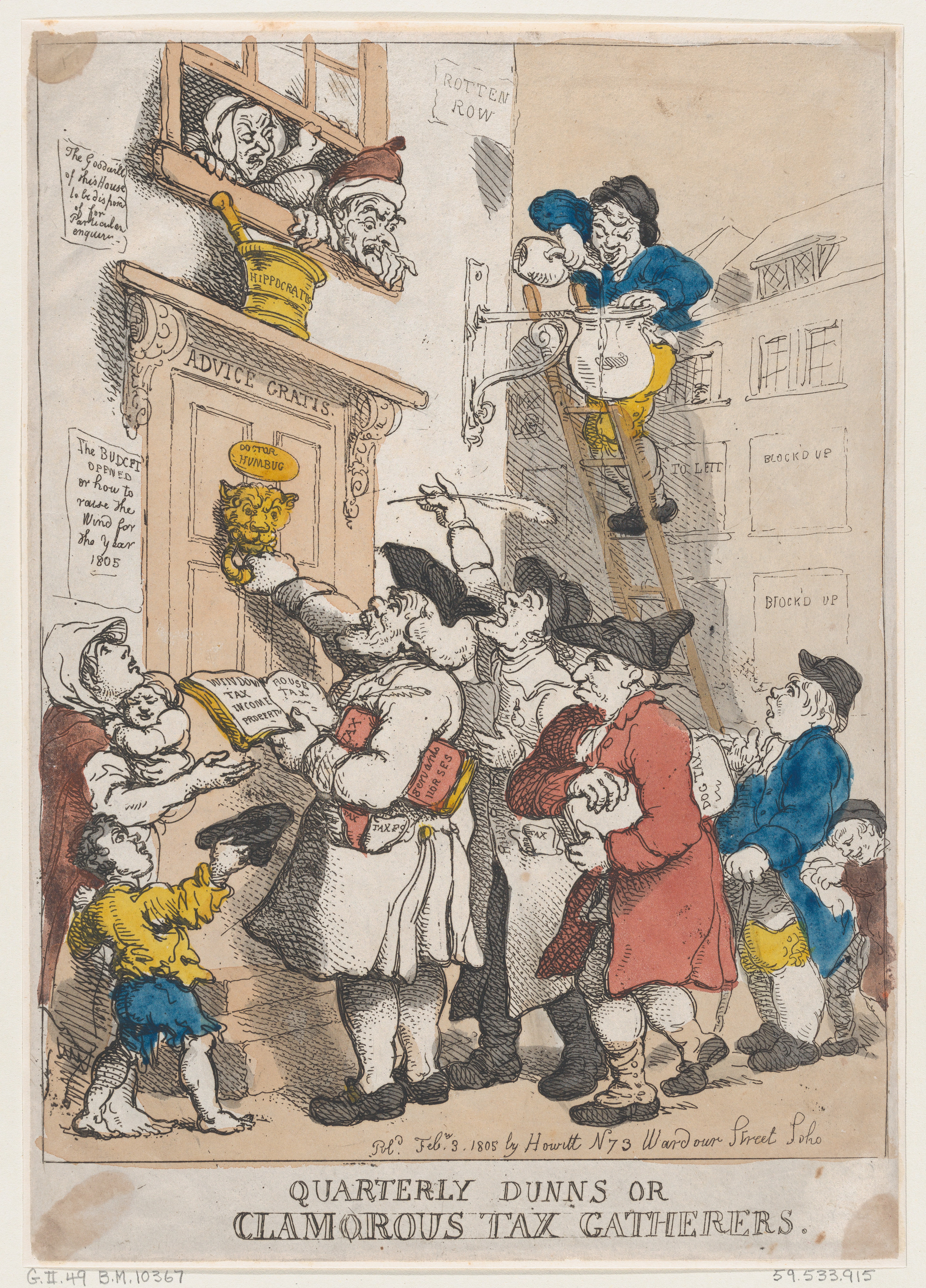Friday, 31 January 2020
The Taxman and the Farmer
Today I have been paying the farmer. Because farmers aren't farmers, they're tax-gatherers.
Some people have trade surnames: Mr Baker, Mr Butcher, Mr Farmer etc. And these people happily imagine that in some way off medieval time they had an ancestor who was a baker or a butcher or a farmer. The first two are right, but the Farmers are wrong. Because a farmer is a taxman. Or was.
The name has nothing to do with farms.
Once upon a time, there was the Medieval Latin word firma, which meant a fixed [payment]. (It's related in this to firm, firmament, affirm etc). From this you got the Old French fermier and the English farmer all meaning tax collector, or one who collects a fixed payment.
So Chaucer wrote (with his mind on the taxman):
Him ought not be... cruel As is a farmer to do the harm he can.
This meaning of farmer actually survived all the way to the C19th, although by that time it had become rather odd.
But, feudally, rich landowners used to collect taxes on the land they owned, and they would have middle-men who were responsible for collecting the tax from a particular area. These tax farmers were responsible for a single farm from a single piece of land. They often had responsibility for making sure that it was cultivated its most profitable extent. Often they lived there as a tenant farmer.
People these days buy time-share apartments, which are often just referred to as time-shares. In the same way, the method of payment slowly came to be associated with the activity of agriculture. So the old words husbandman and churl were slowly replaced. And by the late C16th, farmer had become the standard word for somebody who simply owned a farm.
But the surname dates from the C13th. And that's why I've been paying the farmer.
P.S. Terra Firma is not, I'm afraid, related. It was originally the Venetian holding on the mainland.
P.P.S. This is a repost from 2015.
Monday, 27 January 2020
Hypocrites and Horse-Power
 The English word hypocrite has a terribly simple etymology. It comes straight from the Ancient Greek hypokrites, which means actor, the kind you get on a stage, because hypocrites act all pious.
The English word hypocrite has a terribly simple etymology. It comes straight from the Ancient Greek hypokrites, which means actor, the kind you get on a stage, because hypocrites act all pious.I was wondering what extra formations this might produce e.g. a fear of actors, if there is such a thing, ought to be hypocritephobia. And then a strange thought occurred to me: Hippocrates.
Hippocrates was the Father of Medicine. It is from him that we get the Hippocratic oath that doctors have to swear. Of course, it's got nothing to do with hypocrites. The hippo there is usually a horse - that's why a hippopotamus is a river-horse and a horse-racing arena is a hippodrome. And crat is usually power as in plutocrat, aristocrat, theocrat etc.
So, I thought, if my calculations are correct, Hippocrates was really Dr Horsepower.
This seemed hideously unlikely. But I have a cheat for all things classical. My next-door neighbour is a professor emeritus of classics. This is terribly useful to me as I get to pass off his wisdom as my own. So yesterday I seized m neighbour by the buttonhole and asked him straight out: Does Hippocrates mean horsepower?
'I don't see why not,' he replied. 'Yes. Go for it.'
Too good to be true.
'Although,' he added, 'it's more likely to mean horse-controller. But it could mean horsepower. Greek, Mark, is a very flexible language.'
So there it is: Hippocrates, Father of Medicine, was really Dr Horsepower.
Incidentally, the bit of the brain called the hippocampus is not, as is usually believed, a university for hippos. In fact, it's named after the seahorse because it sort-of-vaguely resembles one.
The Inky Fool decides not to take the train
Thursday, 9 January 2020
Exercise and the Ark of the Covenant
 We are in that beautiful season of the year known as January, or to give it its full technical name the-season-of-plump-people-jogging. Luckily for all of us, it will be over in a few days, and we may return to our restful cakes and our crumpets of calm.
We are in that beautiful season of the year known as January, or to give it its full technical name the-season-of-plump-people-jogging. Luckily for all of us, it will be over in a few days, and we may return to our restful cakes and our crumpets of calm.Originally, exercise was something that Romans did to horses (and soldiers). It was too cruel for proper people. Most of the time horses (and soldiers) were kept penned up so that they couldn't run away. The Latin word for penning up or enclosing was arcere. Occasionally, they would be let out to go and canter freely in the paddock or take up horsey-pilates or whatever it was. To do this was to ex-arcere them, and from that you got exercere, and modern exercise.
The word arcere also gave us the adjective arcane, because arcane knowledge is knowledge that is enclosed and shut away and locked up in a big box. Indeed, arcere itself comes from the noun arca which means box or chest or ark.
The Ark of the Covenant was simply a very fancy chest. We refer to it as an ark because the Latin Bible called it an arca. The Ten Commandments contained therein were therefore the original arcane knowledge. And when, as it saith in the book of Indiana Jones, all those spirits jumped out and killed the nasty Nazis, they were simply exercising.
The Inky Fool's filing system was becoming ever more efficient.
Friday, 3 January 2020
The Two-Faced Janitors of January
 [Repost]
[Repost]Welcome, dear reader, to January. January is a time to look back upon the dunghill of a year that has passed, and to look forward to the miseries to come. However, it is impossible to look both backwards and forwards unless you have two faces and you only have one, I hope. Otherwise you suffer from the horrid genetic disorder known as diprosopus, or you are the Roman god Janus [see picture].
Because Janus had two faces and was able to look in two directions he was the god of boundaries. The first month of the year, being the boundary between the old and the new, was therefore sacred to him and was named Januarius or January.
Janus was also, of course, the god of gates and passages and doorways and portals of all sorts, and that is why doorkeepers are called janitors.
Leonato: You will never run mad, niece.
Beatrice: No, not till a hot January.
I am told that these lines from Much Ado About Nothing sound rather odd when performed in Australia.
Sacred to Janus
Subscribe to:
Posts (Atom)














